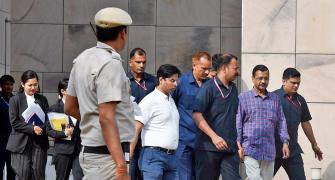Age and experience not less relevant but firms are gradually moving towards younger leadership teams

The age profile of senior management executives — typically managing directors, chief executives, presidents and those in higher ranks — at Indian companies is undergoing a change, slowly but steadily.
If a few recent reshuffles are anything to go by, the norm for these positions — being a sexagenarian (between 60 and 69 years of age) or septuagenarian (between 70 and 79), with a wealth of experience — seems to be changing in favour of relatively young professionals.
Last week, cigarettes-to-hotel major conglomerate ITC undertook a management rejig that entailed not only swapping of roles among the senior-most executives but induction of younger people for key positions. Sanjiv Puri, 51, for example, was named president of ITC’s fast-moving consumer goods (FMCG) business, a position believed to have been created especially for him.
The promotion helped Puri make it to the corporate management committee of the company, the crucial second layer below the board, which oversees the actual running of the company.
Replacing Puri as chief executive of the tobacco division was B Sumant, another 51-year-old, who was given additional charge of FMCG trade, marketing & distribution. Sumant previously was managing director of ITC Infotech. Sushma Rajagopalan, 49, was appointed chief executive of ITC Infotech. Also, executives like 48-year-old Sandeep Kaul, chief executive of ITC’s personal care division and 50-year-old Atul Chand, chief executive of the lifestyle retailing division, have been around for a while. These clearly suggest an overall reduction in age profiles of ITC’s top executives.
Kolkata-based ITC is not the only company that is keenly looking to younger talent. Most consumer goods companies — from Hindustan Unilever (HUL) to Marico, Godrej Consumer Products and Emami — are trying to make their boards younger.
HUL managing director and chief executive Sanjiv Mehta, for example, is only 53 years old. Similarly, when Marico last year promoted Saugata Gupta as its MD, he was only 46.
Ditto for Godrej Consumer, which had named a 43-year-old Vivek Gambhir its MD in 2012. At a group level, the Adi Godrej-led Rs 13,500-crore (Rs 135 billion) conglomerate has brought down the average age of its senior leaders to 45 years, to transform itself into a next-gen, global Indian enterprise. The move coincides with its plan for a ten-fold increase in revenue over the next 10 years.
Speaking to Business Standard earlier, Adi Godrej’s daughter Nisa Godrej, 36, who is in charge of corporate strategy and human capital, had said a younger management and workforce could help the group achieve its objectives better. “To achieve our 10-by-10 strategy, we need to maintain our pace of growth at around 26 per cent a year. Besides putting in place systems and processes, we will need a highly skilled and motivated workforce for this.”
Apart from consumer goods, sectors like manufacturing, heavy industries and capital goods are also following the ‘young’ trend. Larsen & Toubro, a traditional company, for instance, has hired relatively young directors (in the age group of 50 years) for its board. The idea is to get younger executives at the senior level, where the average age of executives so far was 65-70 year.
Even the Tata group, itself about 150 years old, inducted a 44-year-old Cyrus Mistry as its chairman towards the end of 2012, after a prolonged search for a successor to Ratan Tata. Since then, Mistry has brought on broard fairly young executives, to reshape the group and to help him drive his vision.
In an interview with Business Standard last year, L&T chairman A M Naik had said he wanted a younger leadership that could stay on a for a while (at least 10 years) and take the group forward.
“This change in mindset is welcome,” says Arvind Singhal, chairman of retail consultancy Technopak. “Partly, it is led by the New Companies Act that caps the time directors can stay on board, and prescribes the need for expanding board positions, among other things. Today, there is an endeavour (among Indian companies) to be more accountable to shareholders, implying there is a need for strong, capable and independent boards. This also means that you need younger people, who can devote 10-15 years before they superannuate or are be pushed out.”
Most companies and century-old groups are revamping their recruitment and human resource policies to strengthen their leadership pipelines, driving performance-linked incentives and laying greater emphasis on training and development. Though age and experience are not yet close to becoming irrelevant, experts see a gradual shift at Indian companies towards relatively young leadership teams as a welcome sign.










